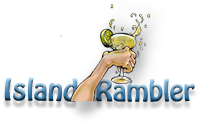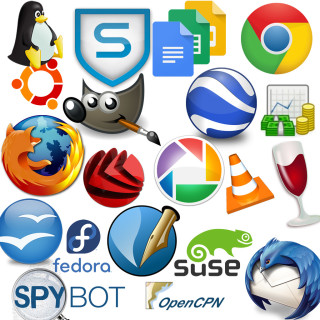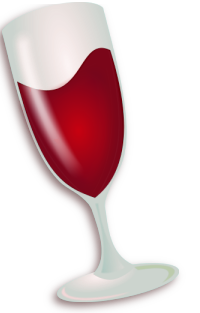Lets start with a worst case scenario, you dink-it back to the boat after an exciting day ashore. You open up your laptop eager to share your adventures with all your land lubbing friends and nothing, dead. Lord Neptune as taken his toll and you no longer have a working computer. What do you do? There’s a little hacker secret where by you can resurrect an older functioning second hand system by installing a light weight version of Linux.
Commercial operating systems like Windows and OSX to an extent get more resource hungry with every new release. Meanwhile out in the open source community people are creating and releasing operating systems that are lean, mean, and light weight. Designed specifically to work with older systems. These operating systems rely on being compact and efficient to free up CPU and memory resources for the user and that’s where the trick lies.
Someone might tell you “Oh Linux!! stay away, it’s too complicated to use!” That may have been true 10-15 years ago; now-a-days Linux looks and works just like commercial operating systems, even better in some cases.
There are three major ‘flavors’, if you will, that I have personally used: Fedora, a free consumer version of Red Hat Linux, it’s exceptionally stable and makes a great desktop OS. Next up is Suse, a free consumer version of Novell’s commercial server OS. Novell is a great tech company with some very skilled developers. The third option is Ubuntu. This Linux flavor is aimed directly at re-purposing lower performance systems as desktops and has stripped out a lot of the unnecessary to provide a clean interface. Anyone of these operating systems would be an excellent option, dealers choice.
Okay perfect, your cousin twice removed sent you her old Dell Laptop and you have successfully installed the Linux flavor of your choice. This should reduce some of the panic and get you back to some level of normalcy.
There is one caveat. If you have a third party application that requires Microsoft Windows you may be in trouble. There’s a Windows compatibility layer for Linux, WINE, but it’s notoriously frustrating. Especially when it comes to I/O and software that wants to talk to proprietary hardware. You can give it a try but be warned if it doesn’t work you may have to work a little harder as most vendors will run away at the first mention of WINE. Luckily the WINE community is extremely capable.
After a working system, I’m pretty sure the next thing most people look for is a good secure internet browser.
 Firefox is my favorite browser mainly because of the stability, consistency, and third party plug-in support. I also like the fact that they are the keepers of the Mozilla renderer. It’s pretty much the gold standard for how HTML/CSS is supposed to be interpreted.
Firefox is my favorite browser mainly because of the stability, consistency, and third party plug-in support. I also like the fact that they are the keepers of the Mozilla renderer. It’s pretty much the gold standard for how HTML/CSS is supposed to be interpreted.
 Chrome is a nice browser that’s managed by Google. Being from Google if you use any Google tools it seamlessly integrates everything for you. It’s biggest claim to fame is it’s rendering speed and minimalist interface. It does render pages pretty fast, but I find that my connection speed is the real bottleneck, so it’s kind of moot.
Chrome is a nice browser that’s managed by Google. Being from Google if you use any Google tools it seamlessly integrates everything for you. It’s biggest claim to fame is it’s rendering speed and minimalist interface. It does render pages pretty fast, but I find that my connection speed is the real bottleneck, so it’s kind of moot.
 Lets talk about email. We all have accounts these days (I personally have five). A lot of people use a web browser to access their accounts, while this works, I personally like to use an email application (e.g. Outlook, Apple Mail). This allows me to go ashore log-in, sync-up then work on replies and missives offline on the boat at my leisure. Later I can re-sync when it’s convenient for me. To do this, I use Thunderbird. It’s produced by the same group that manages Firefox, so you know it’s good stuff.
Lets talk about email. We all have accounts these days (I personally have five). A lot of people use a web browser to access their accounts, while this works, I personally like to use an email application (e.g. Outlook, Apple Mail). This allows me to go ashore log-in, sync-up then work on replies and missives offline on the boat at my leisure. Later I can re-sync when it’s convenient for me. To do this, I use Thunderbird. It’s produced by the same group that manages Firefox, so you know it’s good stuff.
 Your mom and I want to talk to you about protection. If you’re going to be engaging in late night internet activities you’re going to need some protection. If you’re a Windows user I recommend Spybot Search and Destroy. If you’re a Mac user the best suggestion I can offer is Sophos. For the Linux users out there, BitDefender is my weapon of choice. Always remember to compute safely!
Your mom and I want to talk to you about protection. If you’re going to be engaging in late night internet activities you’re going to need some protection. If you’re a Windows user I recommend Spybot Search and Destroy. If you’re a Mac user the best suggestion I can offer is Sophos. For the Linux users out there, BitDefender is my weapon of choice. Always remember to compute safely!
 Those weekly slide deck presentations can become quiet burdensome while trying to enjoy your Painkiller on the boat, NOT!! Even if you don’t have to do any presentations or giant spreadsheets it’s nice to have a productivity suite at your disposal. For the little things like keeping a personal journal and maybe manage the boat’s expenses. For this, hands down the best tool is Open Office. It’s a Java based replica of Microsoft’s Office. I’ve been using it for ten plus years and love it!
Those weekly slide deck presentations can become quiet burdensome while trying to enjoy your Painkiller on the boat, NOT!! Even if you don’t have to do any presentations or giant spreadsheets it’s nice to have a productivity suite at your disposal. For the little things like keeping a personal journal and maybe manage the boat’s expenses. For this, hands down the best tool is Open Office. It’s a Java based replica of Microsoft’s Office. I’ve been using it for ten plus years and love it!
There’s a second option in this category, Google Docs. Google Docs is a powerful suite, however it does require you to be online to use. As we all know, internet connectivity is not always reliable aboard. For this reason I like the stand alone Open Office option.
 I KNOW navigation is something all us sailors have a keen interest in. My boat does have an integrated chart plotter and GPS antenna and I trust it. But it’s not the nicest tool when it comes to integration. As a backup I do a lot of chart plotting on my laptop with a free tool called OpenCPN. By combining OpenCPN with NOAA’s free bathymetric charts and an inexpensive USB GPS antenna
I KNOW navigation is something all us sailors have a keen interest in. My boat does have an integrated chart plotter and GPS antenna and I trust it. But it’s not the nicest tool when it comes to integration. As a backup I do a lot of chart plotting on my laptop with a free tool called OpenCPN. By combining OpenCPN with NOAA’s free bathymetric charts and an inexpensive USB GPS antenna
you can plot your course on your computer just like your multi-thousand dollar chart plotter, except without the Ingress Protection.
There is another fun navigation tool out there, Google Earth, it does not have soundings or aids to navigation but still has some interesting uses. It does give you satellite views and crowd sourced photos, which is super fun when researching the new island ahead.
 Want to give your photos that extra bit of awesomeness? Fear not, there is a free tool out there just for such work, Gimp. It’s a comprehensive photo editing package, not quite Photoshop, but more than powerful enough to handle 99% of anything you would need.
Want to give your photos that extra bit of awesomeness? Fear not, there is a free tool out there just for such work, Gimp. It’s a comprehensive photo editing package, not quite Photoshop, but more than powerful enough to handle 99% of anything you would need.
 If you’re looking for a tool to manage your unruly collection of photos there’s a tool by Google called Picasa that will help you organize and view your images. The best feature is you can keyword tag your images which makes for quick and easy photo search and retrieval. No more spending hours and frustration trying to find that one picture!
If you’re looking for a tool to manage your unruly collection of photos there’s a tool by Google called Picasa that will help you organize and view your images. The best feature is you can keyword tag your images which makes for quick and easy photo search and retrieval. No more spending hours and frustration trying to find that one picture!
 This next free tool may not be for everyone but it’s worth noting. If your doing any kind of desktop publishing, like Adobe’s inDesign. You’ll understand the capabilities of Scribus. It’s capable of building all kinds of publication items which you can send out for print.
This next free tool may not be for everyone but it’s worth noting. If your doing any kind of desktop publishing, like Adobe’s inDesign. You’ll understand the capabilities of Scribus. It’s capable of building all kinds of publication items which you can send out for print.
 Managing money on a boat is not a hugely difficult project you could do it using Open Office’s spreadsheet or your fingers and toes if necessary. However, if you’re looking for something that’s a little more like Quickbooks there’s GnuCash. It’s front end is a little dated, but don’t let that fool you. GnuCash is a fully capable and comprehensive database driven accounting system.
Managing money on a boat is not a hugely difficult project you could do it using Open Office’s spreadsheet or your fingers and toes if necessary. However, if you’re looking for something that’s a little more like Quickbooks there’s GnuCash. It’s front end is a little dated, but don’t let that fool you. GnuCash is a fully capable and comprehensive database driven accounting system.
 Most operating systems have a some method of playing streaming media however there’s a free tool out there called VLC. It plays almost every type of video imaginable. I use it on my boat to play DVDs and it has never let me down.
Most operating systems have a some method of playing streaming media however there’s a free tool out there called VLC. It plays almost every type of video imaginable. I use it on my boat to play DVDs and it has never let me down.
I want to take second to talk about some new technologies that are being advertised all over the internet these days and it’s affect on us cruisers: Software As A Service (SAAS) and Cloud computing. These technologies are not inherently bad but they do pose some problems. They rely on good high bandwidth internet connections, something we cruisers don’t always have. For this reason I avoid all programs free or commercial that rely on internet connectivity to work(except for internet tools). I don’t want to be floating on the hook in a deserted idyllic cove, Whiskey in hand, working on my memoirs and have an application lock me out because it can’t phone home. Be leery of these technologies if your internet connection is not absolute.
I know a lot of people are very suspicious of downloading software from the internet and I would be negligent if I didn’t cover the possibility of infection. All the applications I have suggested above are clean, virus and ad free. With that said, if you want to download them start from their home pages and only use the download paths they point you to. If you try to get them from other sites you are risking infection, be prudent and careful.
As you can see there are tons of good quality free software tools out there that can help you aboard your boat. Just because it’s free doesn’t mean it’s low quality or sketchy. Actually many of the volunteers that work on these projects take great pride in their products. If you find a particular application that’s super beneficial please send them a few monetary units. It would be a travesty if all the software in the world had to be leased from some money grubbing conglomerate like Initech 1.
There you have it, some really great tools that will make your on-board computer much more useful and doesn’t cost you an arm and a leg in the process. A very rare occurrence in the world of boat ownership!
Cheers, Island Rambler
P.S. If I missed a cool application drop me a note, I’d love to check it out!!
Notes:
- Ever seen the cult classic Office Space? ↩











